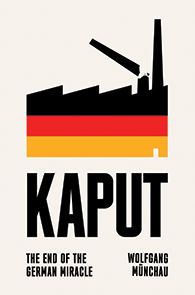Kaput describes a national obsession with the neo-mercantilist export model
KAPUT
The End of the German Miracle
Wolfgang Münchau
Swift Press
London, 2024, 211 pp., $33
Germany is in a funk. Stagnating growth and high living costs have led to much hand-wringing about what went wrong and how to move forward, including during the recent election campaign. For the first time, the navel-gazing extends to questions about the viability of Germany’s postwar economic model itself.
Wolfgang Münchau’s Kaput: The End of the German Miracle could therefore not be timelier. A veteran commentator on European economics at the Financial Times, he offers a scathing account of his native country’s many missteps and wrong turns over the past 30 years.
Germany’s structural economic weaknesses are well known: the fixation on manufacturing (especially of fossil-fuel-powered cars), the dependence on energy imports from Russia and on exports to China (replaced recently by the United States), the scarcity of skilled labor, the excessive bureaucracy, the slow pace of digitalization, the parochial financial system, and the gross neglect of infrastructure investment because of rigid fiscal rules.
What makes Münchau’s book stand out is its astute analysis—richly supported by anecdotes—of the interplay between politicians, corporate CEOs, labor leaders, bankers, and the media. Collectively, they produced a national obsession with a neo-mercantilist economic model that centered on exporting high-quality goods—motor vehicles, chemicals, and all kinds of mechanical hardware.
Münchau’s perspective is microeconomic. But by developing his narrative around individual actors, trade competitiveness, and the fate of certain industries, he misses an important macroeconomic story: Germany’s historically high national saving rate and related capital account surpluses. Households that save rather than consume incentivize companies to export rather than sell domestically. The government obsesses over keeping budget deficits low rather than making necessary investment. Banks channel all those household savings into risky foreign investments, as happened in the run-up to the euro crisis in the 2010s. The country’s deep-seated aversion to incurring debt is the flip side of its obsession with exports.
It is a symptom of a broader mindset to which Münchau only alludes: the desire not to put at risk what has been attained—Besitzstandswahrung, as they say in German. The lack of a start-up culture, the foot-dragging on new technologies such as fiber-optic networks or electric vehicles, extreme fiscal conservatism—all well documented in the book—can be traced to this particular post–World War II mindset. Elaborating on it would have made the analysis even richer.
Having established how Germany went off course, Münchau shies away from proposing how to right the ship. His only concrete proposal, added as an afterthought in the epilogue and dismissed immediately as unrealistic, is to advance the European capital market union. Meanwhile, his analysis would offer ample opportunities to spell out a realistic reform agenda—for example, modifying the suffocating fiscal debt brake to increase public investment, supporting start-ups, or finally advancing digitalization in earnest.
The book therefore ends on a downbeat, almost defeatist note. Yet there are glimmers of hope, starting with the debate about whether neo-mercantilism can work in a postglobalization era—to which Münchau himself contributes so well. There are nonmanufacturing German companies, even large ones like software developer SAP, that continue to do well. And if conditions are right, some of those expat German entrepreneurs and researchers may decide to return. All may not be lost for Germany, as Münchau suggests.
Opinions expressed in articles and other materials are those of the authors; they do not necessarily reflect IMF policy.









